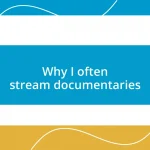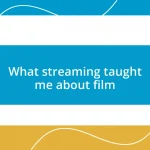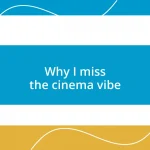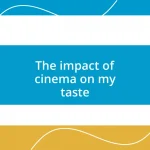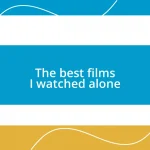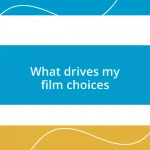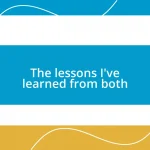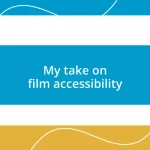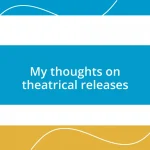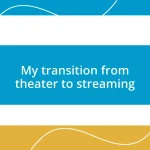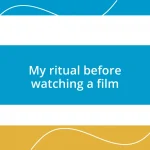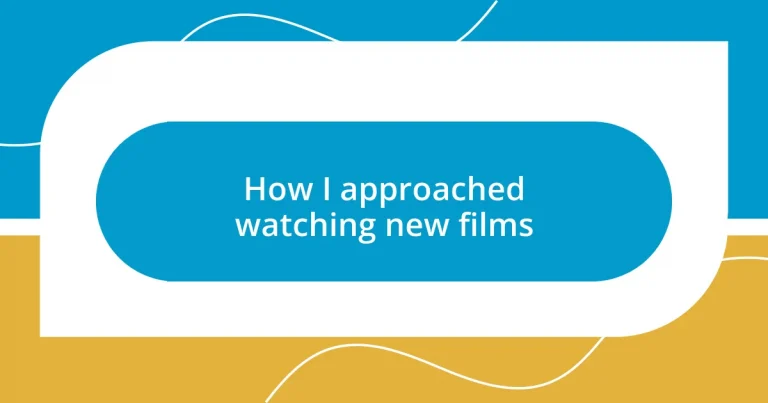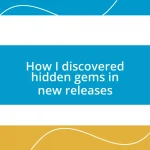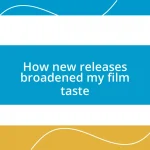Key takeaways:
- Setting specific goals for film watching enhances the experience by fostering personal reflection and connection to themes such as resilience or cultural exploration.
- Note-taking while watching films promotes deeper understanding and engagement with the story, allowing for meaningful discussions and insights later.
- Reflecting on the viewing experience can evoke personal emotions and memories, leading to greater personal growth and appreciation for cinematic narratives.
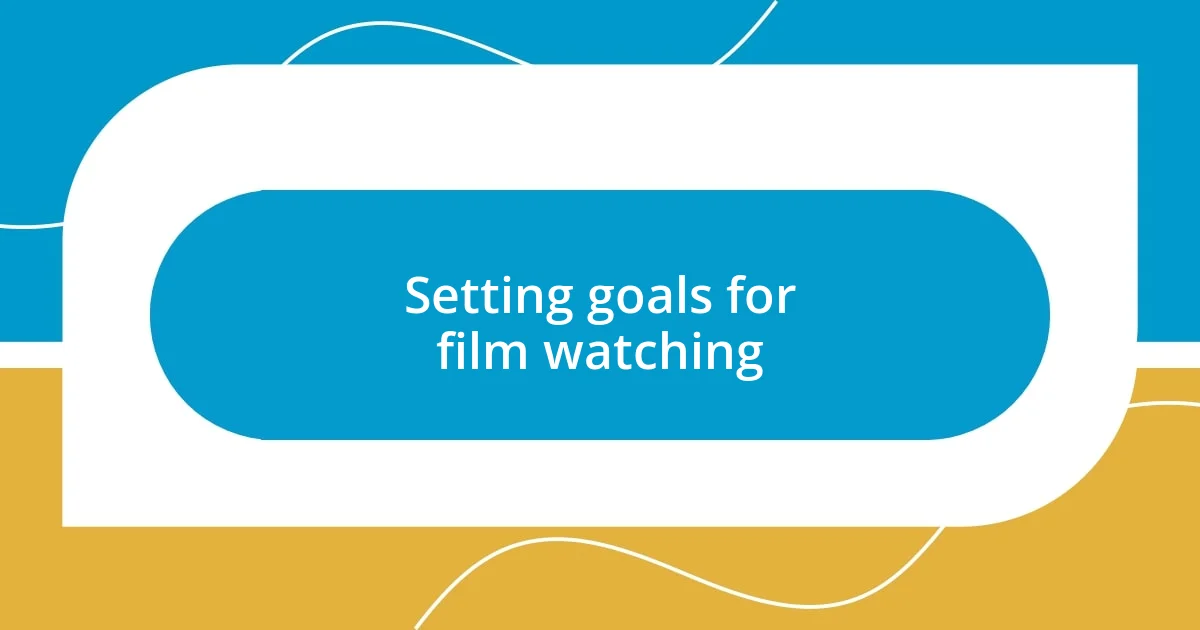
Setting goals for film watching
When I set goals for watching films, it’s not just about ticking titles off a list. I like to think about what I want to feel or learn from each movie, whether it’s sparking inspiration, exploring new cultures, or simply indulging in nostalgia. Have you ever watched a film that completely changed your perspective? For me, “The Pursuit of Happyness” did just that—it reminded me how perseverance can lead to hope.
Sometimes, I choose films based on a theme or personal challenge I’m facing. Last year, I was navigating a tough time, and I set a goal to watch films that dealt with resilience. This led me to titles like “Room” and “The Secret Life of Walter Mitty,” which offered me not just stories, but lessons that resonated personally. Isn’t it fascinating how a well-crafted film can feel like a companion, guiding us through our own journeys?
I also find it helpful to track the genres or directors I’m curious about, a method that adds a layer of excitement to my watching experience. For instance, during my quest to explore more foreign films, I stumbled upon the whimsical world of Studio Ghibli. Have you ever felt a film took you on a journey that was both visually stunning and soul-stirring? Setting these types of goals transforms watching films into a purposeful adventure for me.
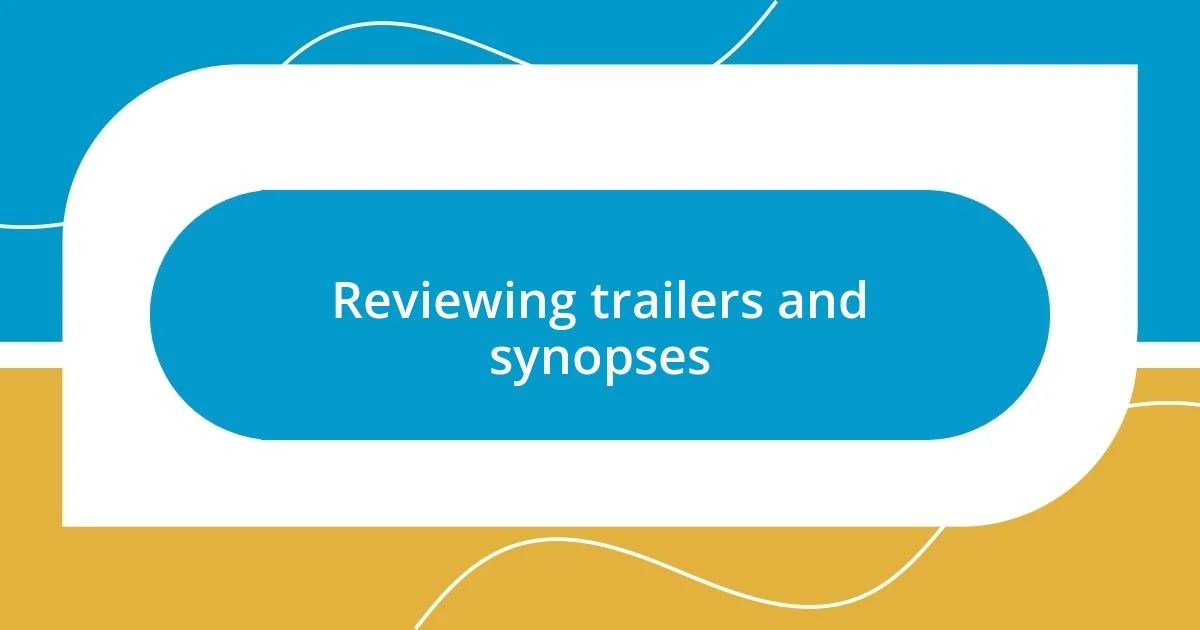
Reviewing trailers and synopses
When I dive into the world of trailers and synopses, I find it’s like peeking through a keyhole into what could be an amazing cinematic experience. Trailers often showcase the visuals and give hints of the storyline, while synopses provide the essential context that helps me gauge whether I’ll resonate with the film’s themes. I remember watching the trailer for “Inception” and feeling an exhilarating rush of curiosity and confusion—it hooked me right away.
- Visual Style: Is the cinematography eye-catching?
- Tone: Does the trailer convey humor, drama, or suspense?
- Plot Hints: Am I intrigued by the plot’s premise?
- Cast: Does the lineup include actors or directors I admire?
- Emotional Impact: How do the trailer and synopsis make me feel?
By assessing these elements, I can create a clearer picture of whether a film aligns with my current mood or interests. Unexpectedly, sometimes it’s the films I don’t think I’ll enjoy that turn out to be the most rewarding experiences.
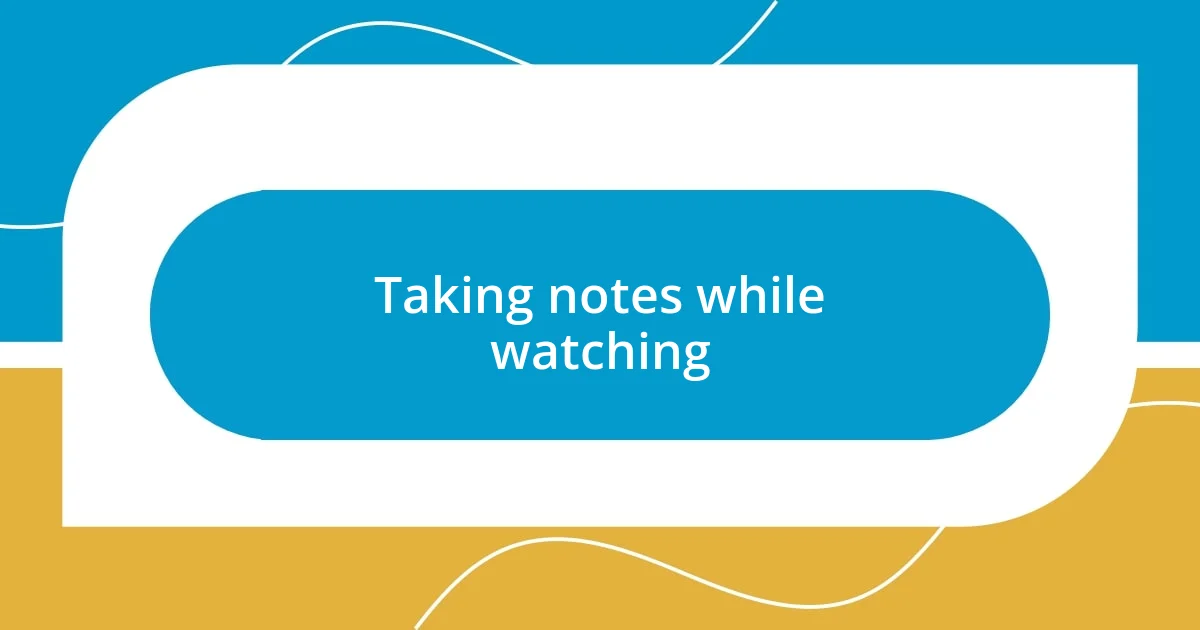
Taking notes while watching
Taking notes while watching films has become an integral part of my viewing experience. I often jot down thoughts that pop into my mind, whether it’s a particularly powerful line or a moment that strikes a chord emotionally. While watching “Eternal Sunshine of the Spotless Mind,” I found myself scribbling about the complexities of memory and love—it felt like a personal reflection more than just observing a story unfold.
In the past, I experimented with different note-taking styles, shifting from simple bullet points to more detailed observations. After watching “Parasite,” I created a table summarizing characters, themes, and my emotional reactions. This method allowed me to revisit my feelings and insights when discussing the film later. Have you ever found that writing down your thoughts helps solidify your understanding of a movie? For me, it’s like having a conversation with my future self about what I just experienced.
For a more structured approach, I often designate specific sections in my notes for plot points, character development, and thematic elements. This practice not only enhances my engagement but also provides a handy reference for sharing recommendations. When I think back to my notes on “The Shape of Water,” I remember that I was captivated by both the visuals and the underlying messages about acceptance. Taking notes enriches my viewing experience and transforms The simple act of watching into an opportunity for deeper reflection.
| Note-Taking Style | Advantages |
|---|---|
| Freewriting | Allows for spontaneous thoughts; captures emotional responses |
| Structured Notes | Organizes ideas; makes for easy referencing later |
| Character Tables | Helps clarify relationships and themes; visually organizes insights |
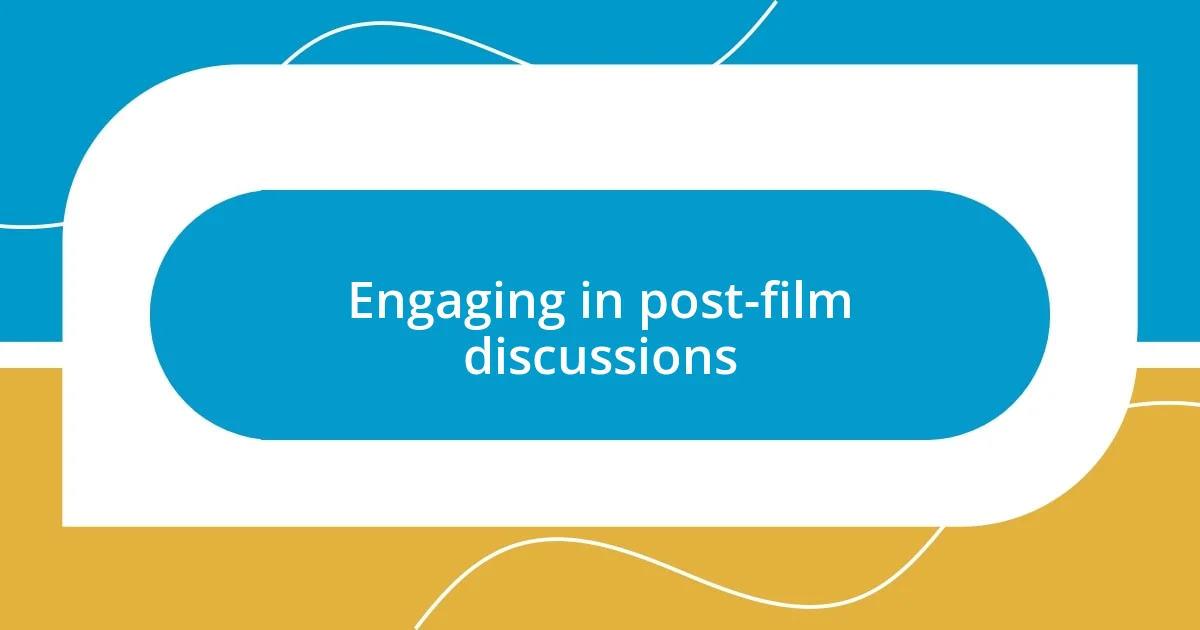
Engaging in post-film discussions
Engaging in post-film discussions is where my cinematic experience truly comes alive. After watching a thought-provoking film like “Get Out,” I found myself buzzing with excitement to share my thoughts. I gathered a few friends, and we passionately debated the film’s themes of race and identity. Hasn’t there been a movie that left you pondering long after the credits rolled? For me, discussing these intricate layers not only deepens my understanding but also enhances the viewing experience.
I also cherish the insights that come from hearing other people’s perspectives. Recently, I watched “Her” and was struck by how one friend interpreted the relationship between humans and technology. It was a viewpoint I hadn’t considered! These conversations often expose interpretations I’d never thought about, making me realize just how rich and nuanced films can be. They challenge my initial reactions and encourage me to explore the story from different angles.
Moreover, I enjoy revisiting films after discussing them with friends. I remember watching “The Lighthouse” again after a deep dive into its symbolism and themes of madness. This time, the film resonated even more profoundly, with new layers of meaning emerging that I hadn’t caught at first glance. Engaging in discussions can feel like peeling back the layers of an onion; the deeper you go, the more revelations come to light. What’s your favorite film discussion moment? I love those moments when everyone brings their personal experiences to the table; it’s like an impromptu film class where we all learn something new together.
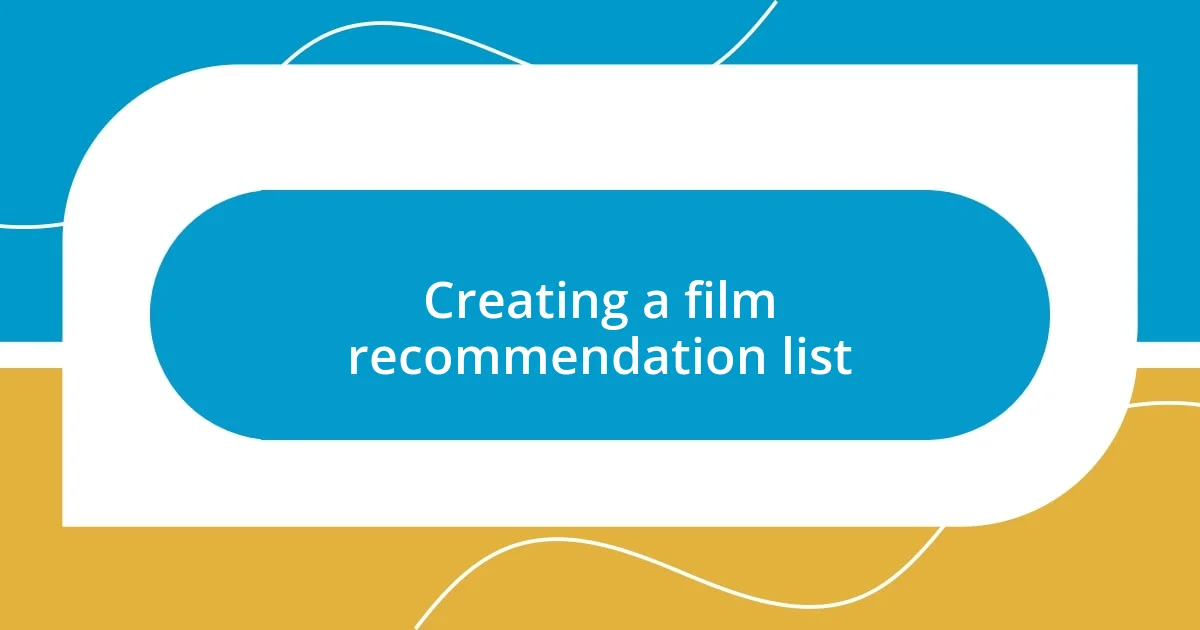
Creating a film recommendation list
Creating a film recommendation list is an exciting way to connect my viewing experiences with others. When I finish a film that resonates with me, like “Moonlight,” I immediately jot down my thoughts and feelings about it. This movie had such a profound impact on my understanding of identity and belonging that I knew I had to share it. Reflecting on those emotional moments helps me articulate why I think someone else should watch it.
The process of selecting films for my list often involves considering what I believe are the standout features of a movie. For instance, I remember highlighting “Lady Bird” for its incredible character development and relatable themes of growing up. It’s interesting to think about how personal interests shape my recommendations. Do you find yourself gravitating towards certain genres or themes when recommending films? Personally, I often recommend coming-of-age stories because they resonate so much with my own formative experiences.
I also make it a point to diversify my list by including films across various genres and cultures. After watching “Pan’s Labyrinth,” I was fascinated by how the fantasy elements intertwined with historical context, creating a rich narrative. Sharing films that challenge or expand cultural perspectives opens up exciting conversations. Crafting this list isn’t just about recommending; it’s about inviting others to explore new ideas and experiences through the lens of cinema.
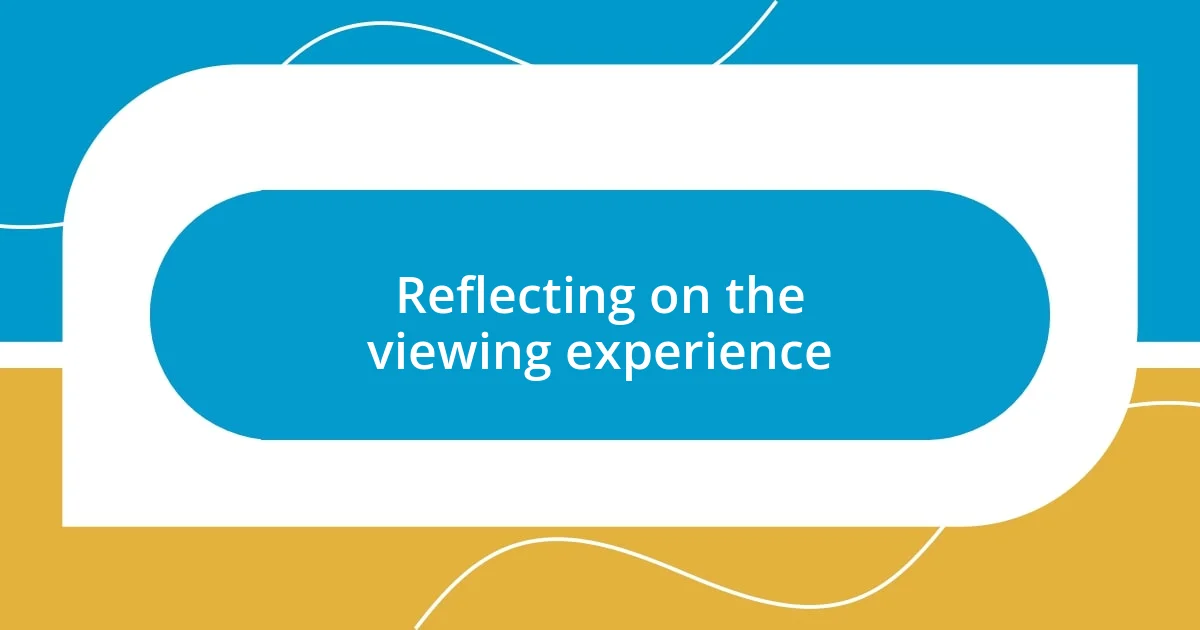
Reflecting on the viewing experience
Reflecting on the viewing experience often triggers a wave of emotions that I find worth exploring. After watching a film that leaves me in awe, I take a moment to jot down my immediate thoughts. I recall watching “The Shape of Water,” and feeling a deep sense of connection to its themes of love and acceptance. That post-viewing reflection became a cathartic process, allowing me to dissect not just the film itself, but my own reactions and feelings surrounding it. Have you ever paused to evaluate how a movie impacted your mood or perspective? It’s like holding a mirror to your soul, isn’t it?
What strikes me most during these reflections is how films can resonate with personal experiences. I remember watching “A Ghost Story” and being profoundly moved by its exploration of time and loss. Afterward, I found myself contemplating my own relationships and the passage of time in my life. It was during those moments of introspection that I realized films do more than entertain; they can evoke memories and emotions that we often keep tucked away. Have you experienced a film that made you revisit a cherished memory or a bittersweet moment in your life?
The beauty of reflecting on the viewing experience lies in its ability to foster deeper connections with the narrative and myself. After seeing “Eternal Sunshine of the Spotless Mind,” I spent hours ruminating on its themes of love and regret. I was struck by how much my perception of relationships changed with each viewing. Each time, I unearthed new insights about my own life and choices, revealing layers I hadn’t previously recognized. Isn’t it fascinating how a film can serve as a catalyst for such personal growth? It makes me appreciate the unique journey every movie takes us on, inviting us to explore not just the story, but our own narratives as well.
